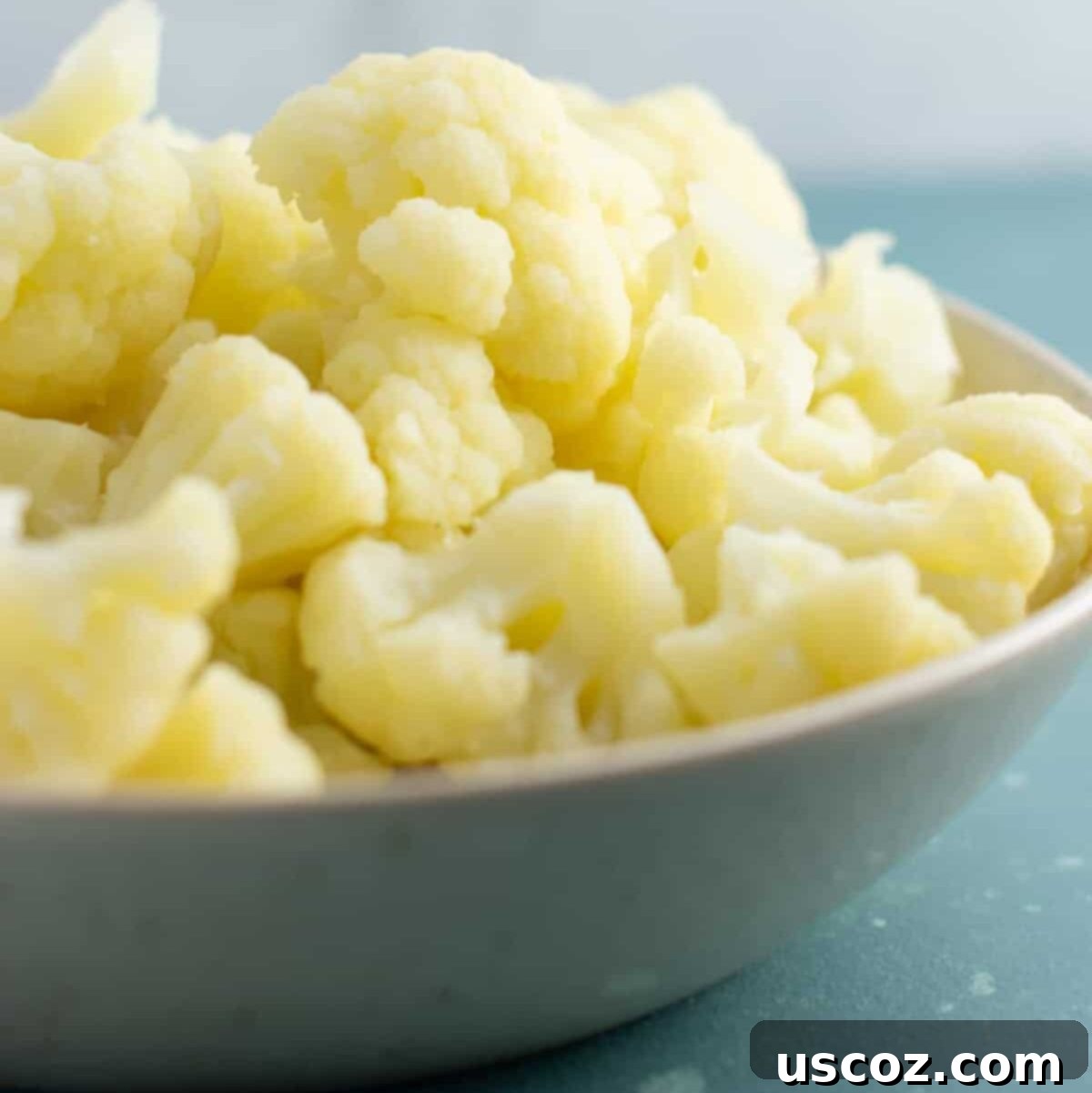Mastering Steamed Cauliflower: Your Guide to Perfect Florets (No Steamer Needed!)
Unlock the incredible versatility and nutritional power of cauliflower by learning the simplest method for steaming it to perfection. Whether you’re aiming for a tender side dish, a base for creamy sauces, or a healthy substitute for grains, perfectly steamed cauliflower is your starting point. And the best part? You don’t even need a dedicated steamer!
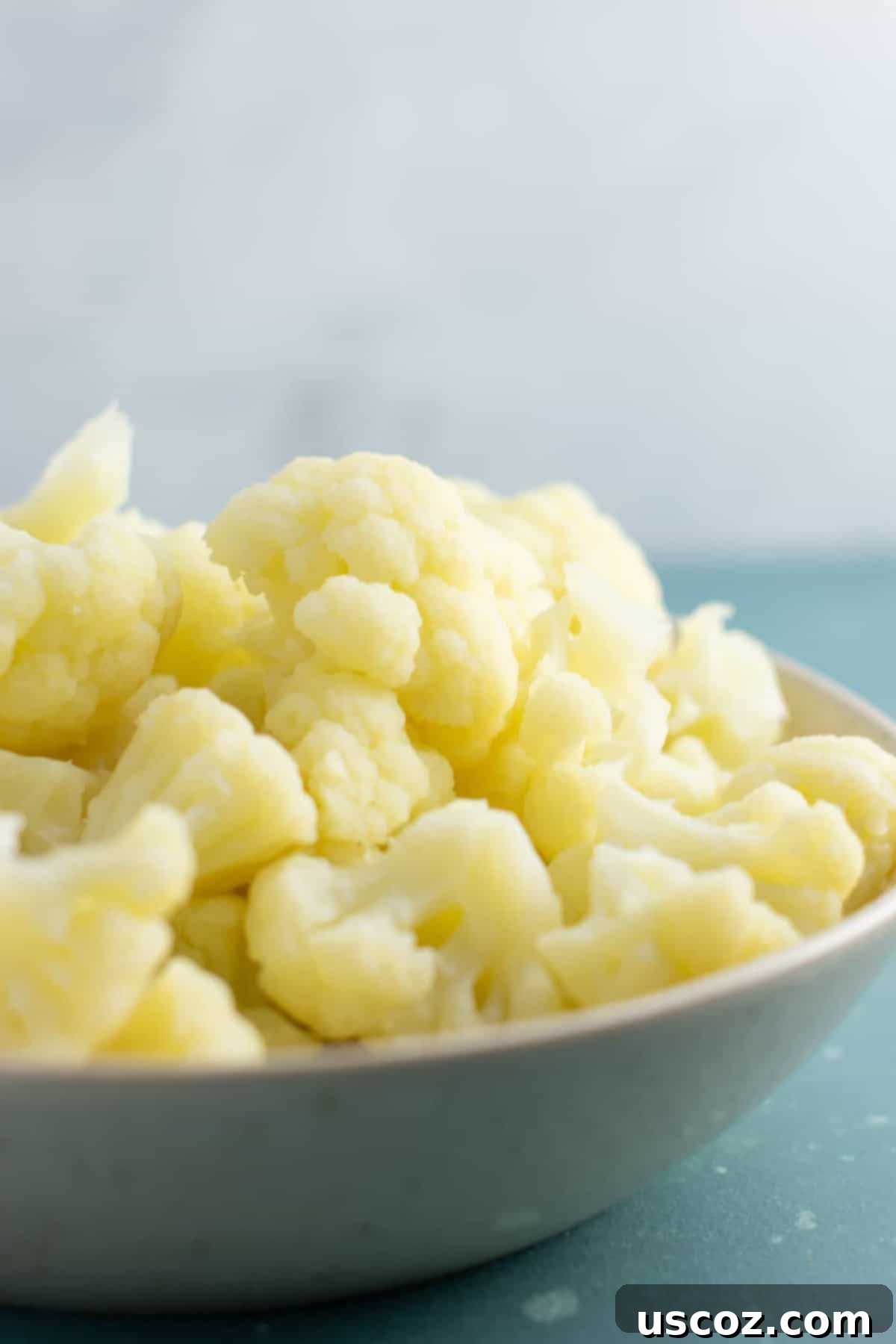
Cauliflower has truly earned its spot as a kitchen superstar. Its mild flavor and adaptable texture make it a fantastic addition to almost any meal. While there are many ways to cook this cruciferous vegetable, steaming stands out as one of the healthiest and most straightforward methods. Steaming preserves its delicate nutrients, ensures a tender yet firm bite, and prevents it from becoming waterlogged – a common pitfall with boiling.
From transforming into a luscious Alfredo sauce to becoming a low-carb “rice” alternative, or simply served as a wholesome side, steamed cauliflower is a culinary chameleon. In this comprehensive guide, I’ll share my foolproof method for steaming cauliflower using everyday kitchen tools, ensuring you get perfect results every single time.
Why Choose Steamed Cauliflower?
Beyond its incredible versatility, steaming cauliflower offers several compelling benefits:
- Nutrient Retention: Steaming helps to retain more of cauliflower’s vital nutrients, like Vitamin C, Vitamin K, and B vitamins, compared to boiling, which can leach them into the water.
- Improved Digestion: Cooking cauliflower makes it easier to digest for many people, and steaming is a gentle cooking method.
- Neutral Flavor: Steamed cauliflower has a clean, neutral flavor that readily absorbs the seasonings and sauces you pair it with, making it a perfect canvas for various cuisines.
- Ideal Texture: Steaming yields tender florets that are still firm enough to hold their shape, avoiding the mushy texture often associated with overcooked cauliflower.
- Diet-Friendly: Naturally low in calories, carbs, and fat, steamed cauliflower is an excellent choice for a variety of dietary preferences, including keto, paleo, vegan, and gluten-free diets.
What You’ll Need: Simple Kitchen Tools
Forget about bulky, single-use kitchen gadgets! My preferred method for steaming cauliflower requires nothing more than items you likely already have in your kitchen:
- A medium to large pot (the kind you might use for cooking pasta).
- A fitting lid for your pot.
- A metal colander or strainer that can sit comfortably inside your pot without touching the bottom when water is added.
The key is to find a colander that fits snugly inside your pot, allowing several inches of space beneath it for water. This setup creates a makeshift steaming environment, trapping the hot vapor to gently cook the cauliflower.
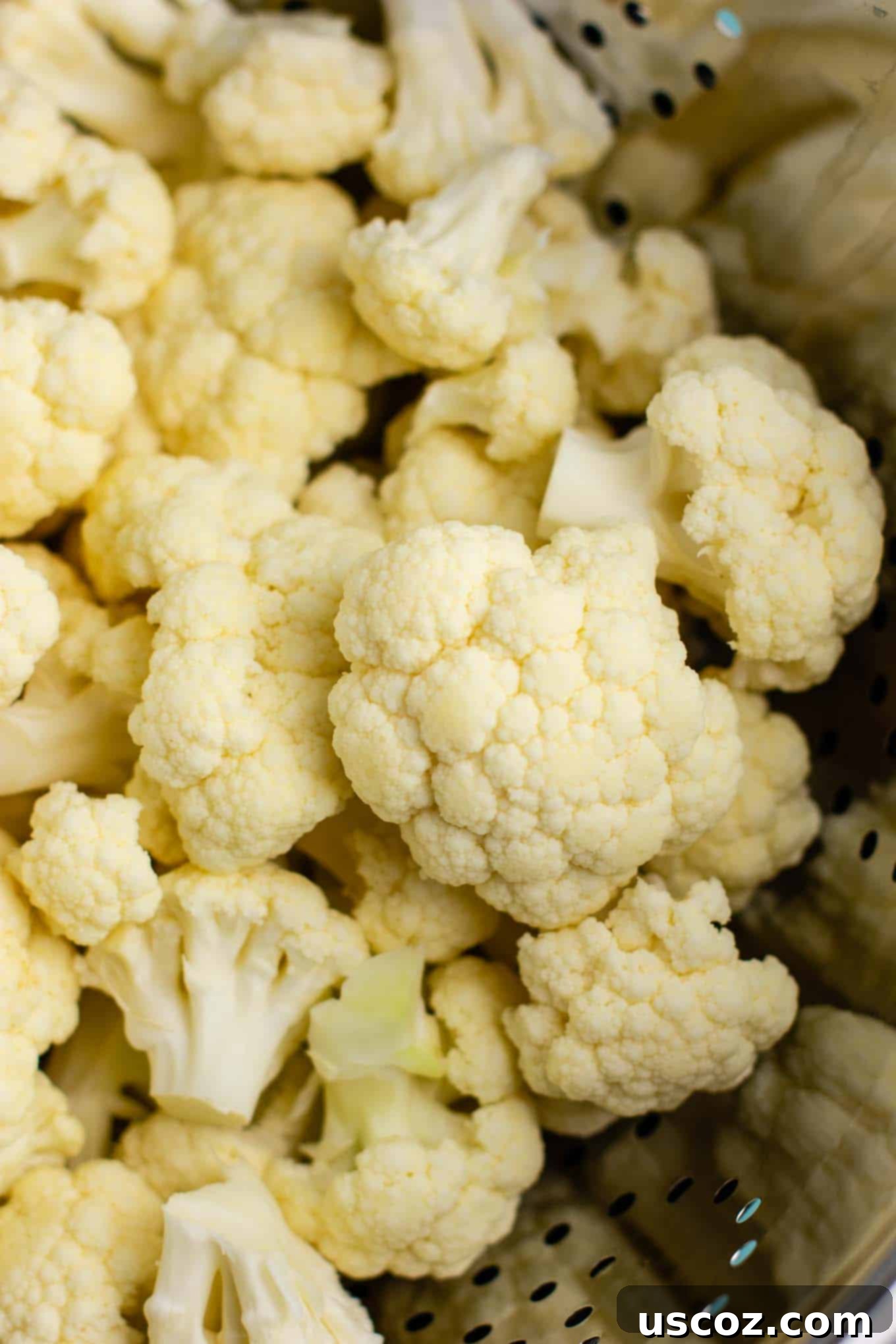
Choosing Your Cauliflower
When selecting a head of cauliflower, look for one that is firm, compact, and has creamy white florets. Avoid any heads with brown spots, soft areas, or a strong odor. The leaves should be green and fresh-looking, clinging tightly to the head.
Preparing Your Cauliflower Florets
Before steaming, you’ll need to prepare your cauliflower. Start by rinsing the whole head under cold running water. Then, carefully remove the outer leaves. Using a sharp knife, cut around the core to remove it. Once the core is out, you can easily break or cut the cauliflower into individual florets. Aim for roughly equal-sized pieces (about 1-2 inches) to ensure even cooking. Smaller florets will cook faster, while larger ones will take longer.
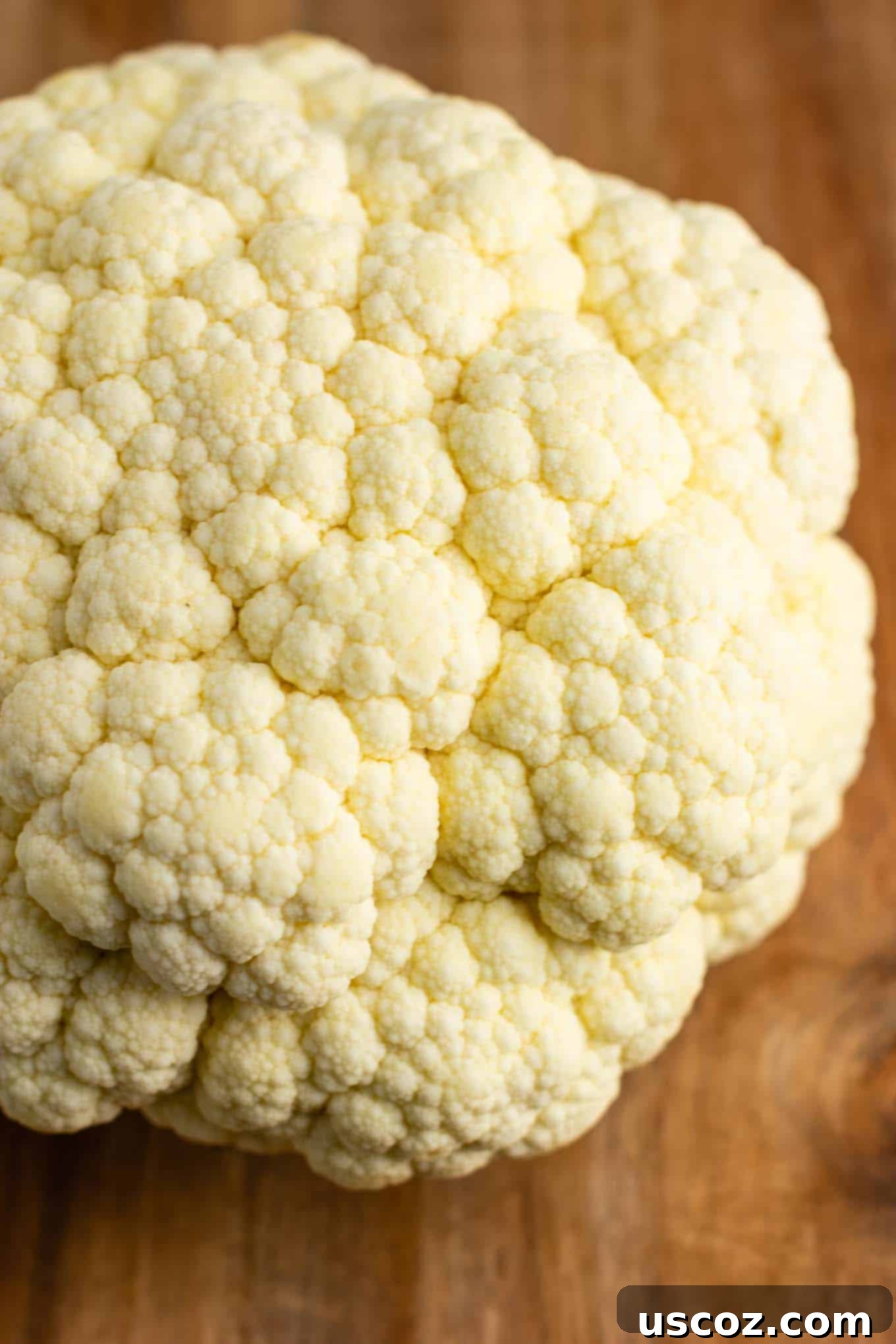
How to Steam Cauliflower: A Step-by-Step Guide
This simple, effective method proves you don’t need fancy equipment to achieve perfectly steamed cauliflower.
Step 1: Prepare Your Cauliflower
As mentioned, start by cleaning and cutting your cauliflower into uniform florets. This consistency is crucial for even cooking. Place all the raw cauliflower florets into your metal colander or strainer.
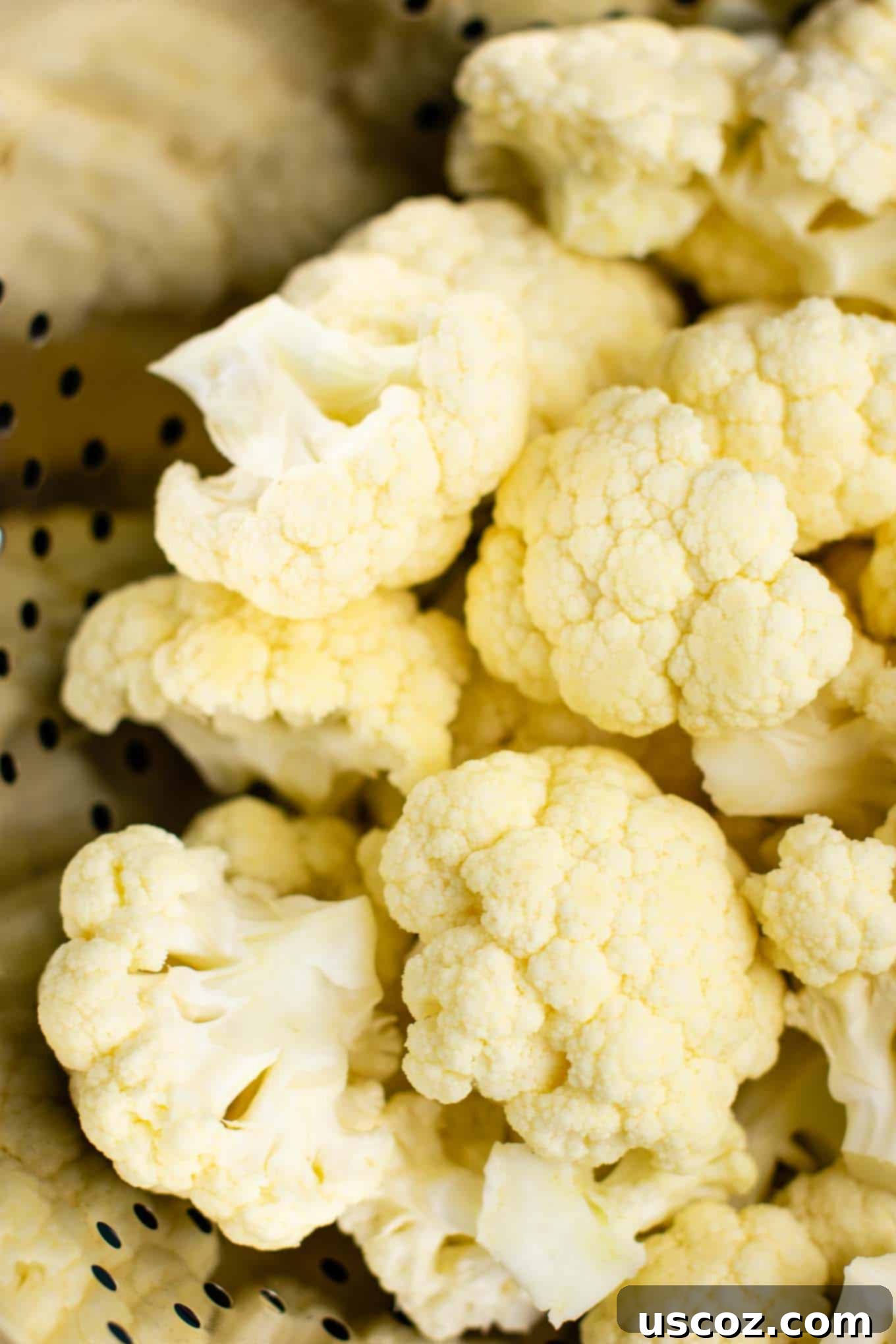
Step 2: Set Up Your “Steamer”
Pour a few inches of water into the bottom of your large pot. The amount isn’t exact, but ensure it’s enough to generate steam for the entire cooking process without touching the bottom of the colander. Place the colander filled with cauliflower florets into the pot. The water should be below the bottom of the colander. Bring the water to a boil over medium-high heat.
Step 3: Steam to Perfection
Once the water is boiling and producing steam, place the lid tightly over the pot, covering both the pot and the colander. This traps the steam, which will gently cook the cauliflower. Reduce the heat to medium-low, just enough to maintain a steady simmer and continuous steam production. The cauliflower will cook in this hot, moist environment.
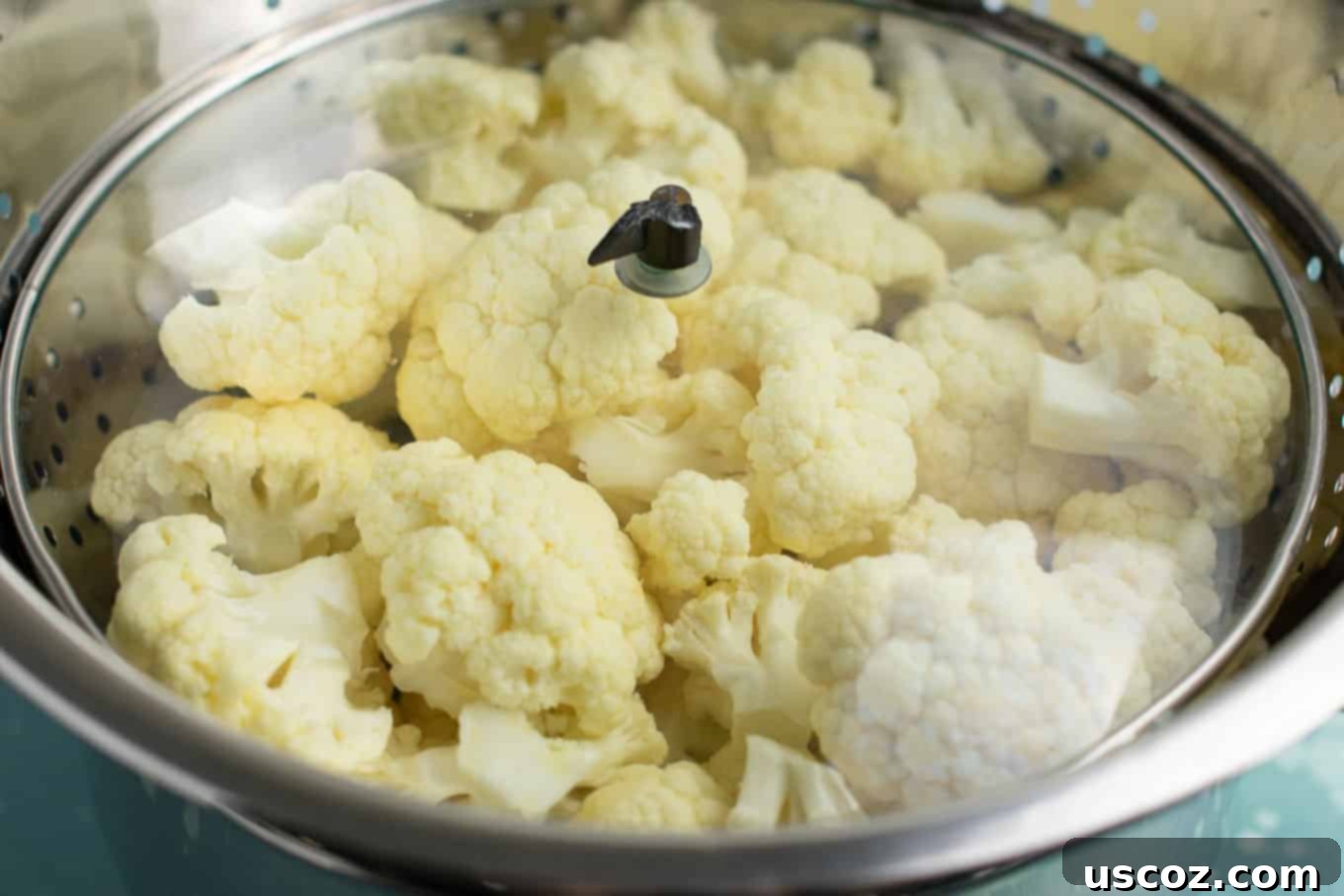
How Long to Steam Cauliflower? Achieving Your Desired Texture
The steaming time for cauliflower can vary quite a bit, typically ranging from 15 to 30 minutes. This range depends largely on two factors: the size of your cauliflower florets and your desired level of tenderness.
- For slightly crisp (al dente) cauliflower: If you prefer your cauliflower with a bit of a bite, perfect for salads or stir-fries, start checking for doneness after 10-15 minutes. It should be tender but still offer some resistance when pierced with a fork.
- For fork-tender cauliflower: For most applications, like a side dish or for mashing/pureeing into sauces, you’ll want it to be easily pierced with a fork. This usually takes between 20-30 minutes. The florets should break apart with minimal effort.
Always test for doneness with a fork. Remember, you can always cook it for a few more minutes, but you can’t undo overcooked, mushy cauliflower!
Don’t Forget the Water: A Crucial Tip
When steaming without a dedicated steamer, it’s easy for the water in the pot to evaporate completely. To avoid this, check the water level every 5-10 minutes. If it’s getting low, carefully add more hot water (to maintain temperature) to the pot. Running out of water can not only stop the steaming process but also lead to a burnt pan, which is no fun to clean!
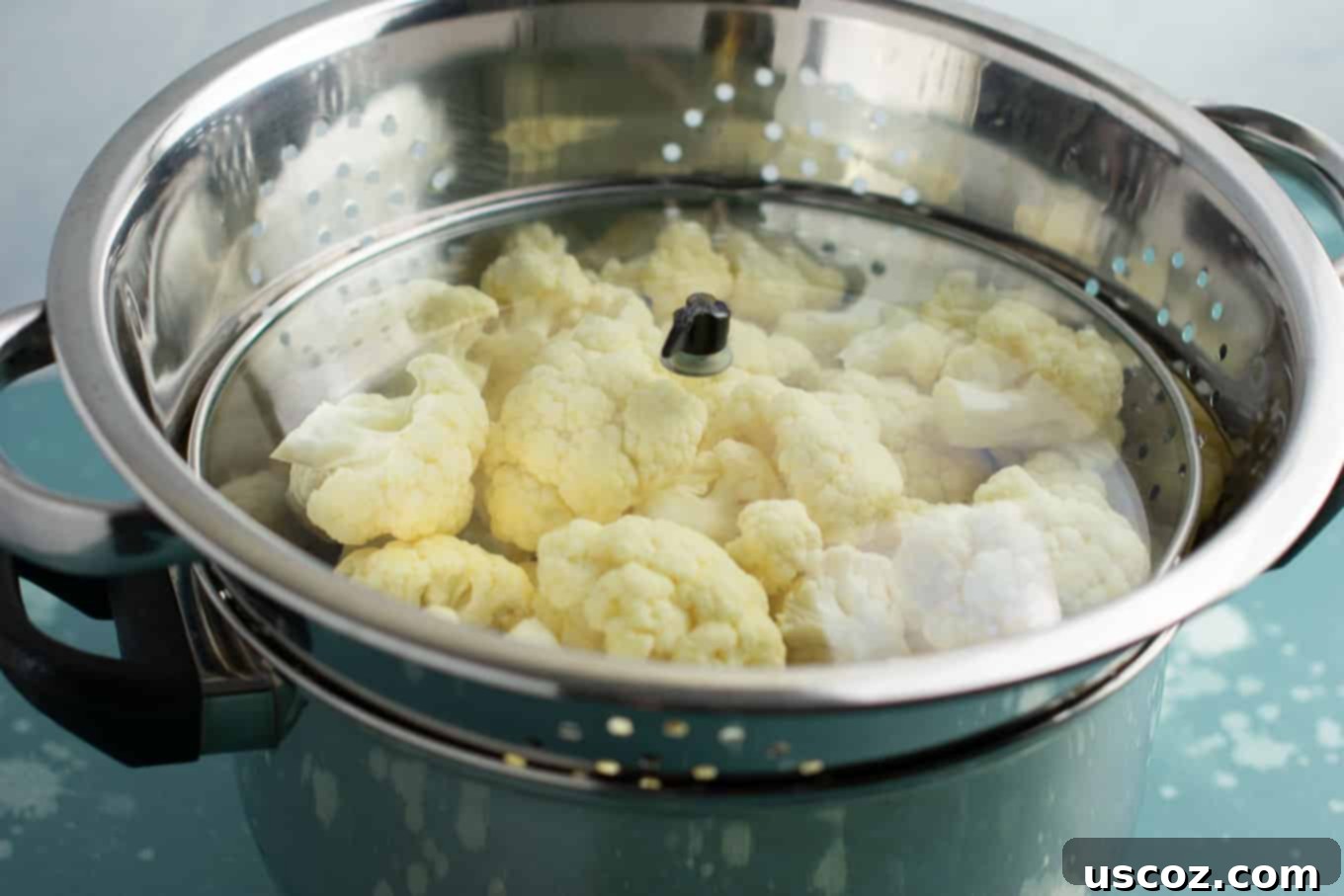
Creative Ways to Enjoy Your Steamed Cauliflower
Once you’ve mastered the art of steaming cauliflower, a world of culinary possibilities opens up! Here are some of my favorite ways to incorporate this humble vegetable into delicious meals:
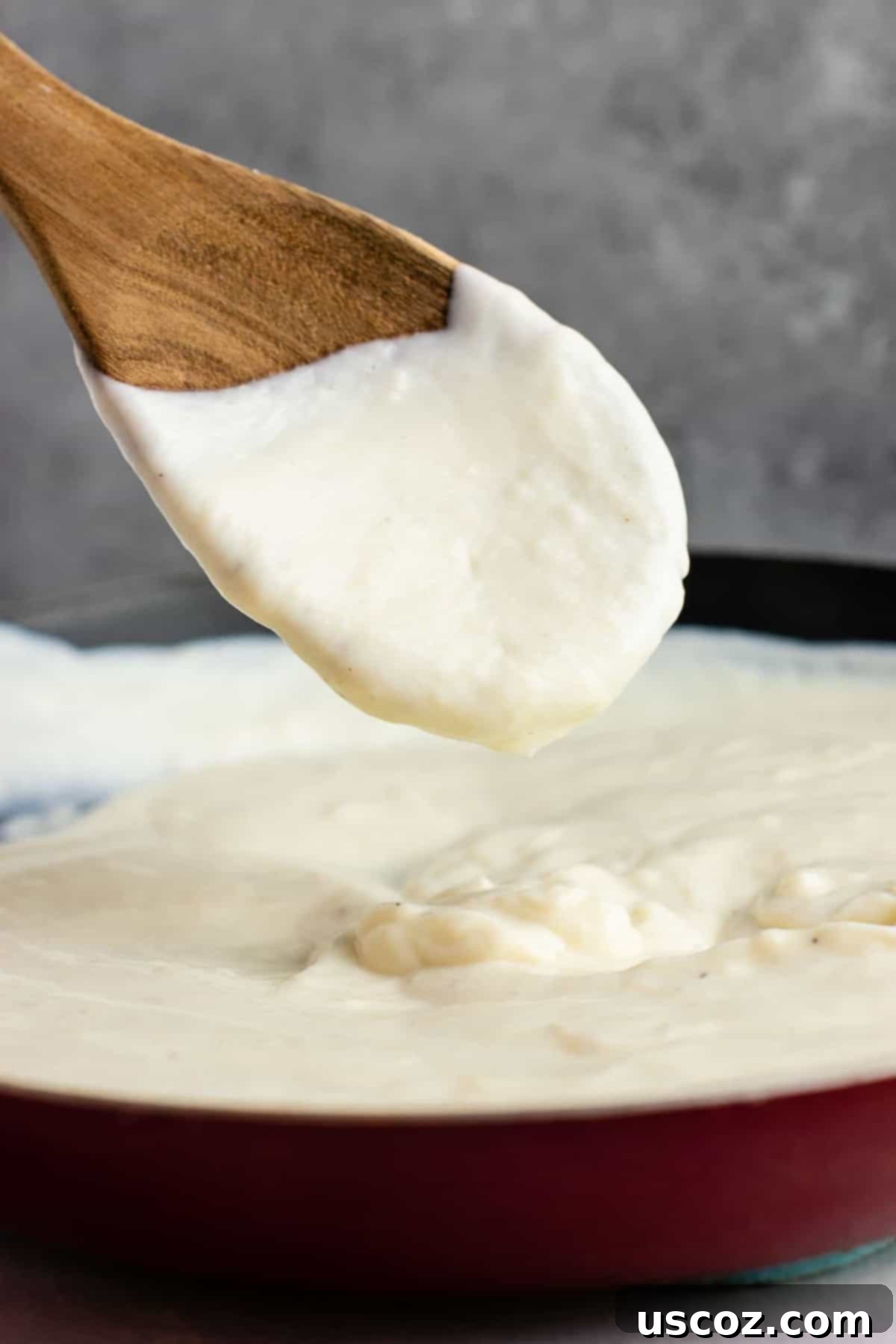
- Creamy Cauliflower Alfredo Sauce: This is an absolute game-changer! Pureed steamed cauliflower forms the base of an incredibly rich and decadent Alfredo sauce that’s healthier than the traditional version but just as satisfying. You won’t believe it’s cauliflower!
- Hearty Pasta Bakes: Combine your steamed cauliflower with other veggies and pasta for a comforting dish. This mushroom cauliflower Alfredo pasta bake is the epitome of wholesome comfort food.
- Simple & Healthy Side Dish: Sometimes, less is more. Serve your steamed florets with a drizzle of melted butter or olive oil, a sprinkle of salt and freshly cracked black pepper, and perhaps a pinch of garlic powder or a squeeze of lemon juice for an effortlessly delicious and healthy accompaniment to any meal.
- Cauliflower Rice Base: For a fantastic low-carb alternative to traditional rice, simply run a knife through your steamed cauliflower until it reaches a rice-like consistency. This pre-cooked “rice” is perfect for stir-fries, burrito bowls, or as a base for curries, offering a quick and healthy shortcut in your meal prep.
- Cheesy Cauliflower Delight: Take your side dish up a notch by topping your perfectly steamed cauliflower with a generous amount of warm, gooey easy cheese sauce. It’s a classic combination that’s always a crowd-pleaser.
- Smooth Soups and Purees: Steamed cauliflower, especially when cooked to a very tender consistency, blends beautifully into creamy soups (like a “cream of cauliflower” soup) or can be mashed into a lighter alternative to mashed potatoes.
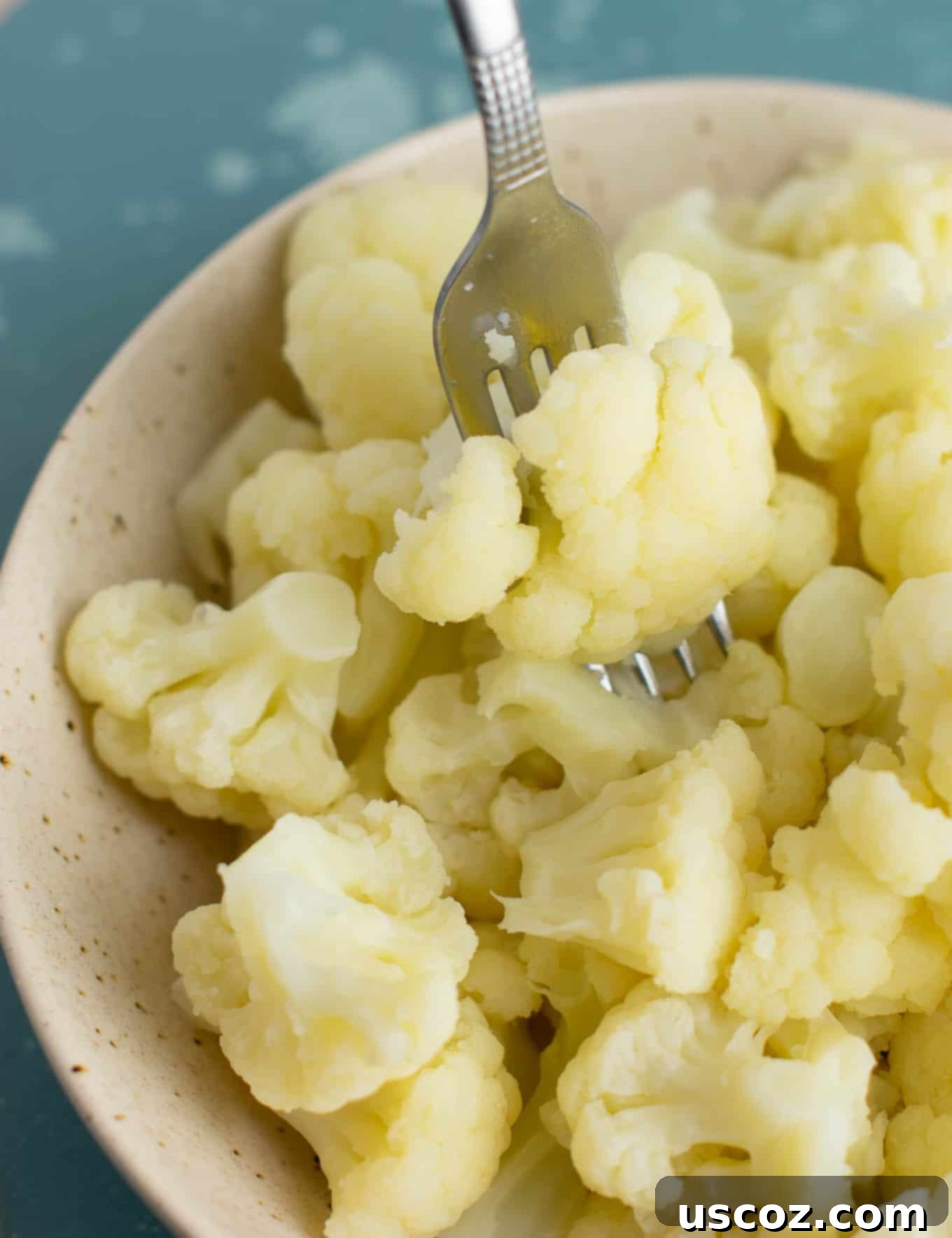
Frequently Asked Questions About Steaming Cauliflower
- Can I steam frozen cauliflower?
- Yes, you can! Place frozen florets directly into your colander and steam. They might take slightly longer than fresh cauliflower, roughly 15-25 minutes, but the process is largely the same. You’ll want to check for tenderness regularly.
- How do I prevent my cauliflower from getting mushy?
- The key is not to overcook it. Start checking for doneness around the 10-15 minute mark. Remove it from the heat as soon as it reaches your desired tenderness. Using uniform florets also helps ensure even cooking, preventing some pieces from becoming mushy while others are still hard.
- Can I season cauliflower before steaming?
- While you can add a pinch of salt to the steaming water, cauliflower generally takes on flavor best *after* it’s steamed. This allows the seasoning to adhere directly to the florets without being diluted by the steam or water. Season with salt, pepper, herbs, or sauces once it’s cooked.
- How long does steamed cauliflower last in the fridge?
- Properly stored in an airtight container, steamed cauliflower will keep fresh in the refrigerator for 3-4 days. It’s excellent for meal prepping and can be easily reheated or added cold to salads.
- What if I don’t have a colander that fits my pot?
- No problem! You can create a makeshift steamer basket. Crumple three balls of aluminum foil, each about the size of a tennis ball. Place them at the bottom of your pot, then rest a heat-proof plate on top of the foil balls. Add water to just below the plate, then place your cauliflower on the plate and cover with a lid. This works just as well!
More Delicious Cauliflower Recipes You’ll Love
- Sweet & Tangy Orange Cauliflower
- Flavorful Teriyaki Cauliflower
- Refreshing Cilantro Lime Cauliflower Rice
- Hearty Cauliflower Rice Burrito Bowl
- Easy Roasted Frozen Cauliflower
- Crispy Air Fryer Cauliflower
Now that you’re equipped with the knowledge to perfectly steam cauliflower, it’s time to get cooking! Whether you’re making a simple side or an elaborate meal, this easy technique will become a staple in your kitchen. I’d love to see your creations!
Don’t forget to tag me on Instagram @buildyourbite and use the hashtag #buildyourbite with your delicious steamed cauliflower recipes!
Be sure to pin this recipe for later and follow Build Your Bite on Pinterest for all the latest tasty and healthy recipes!
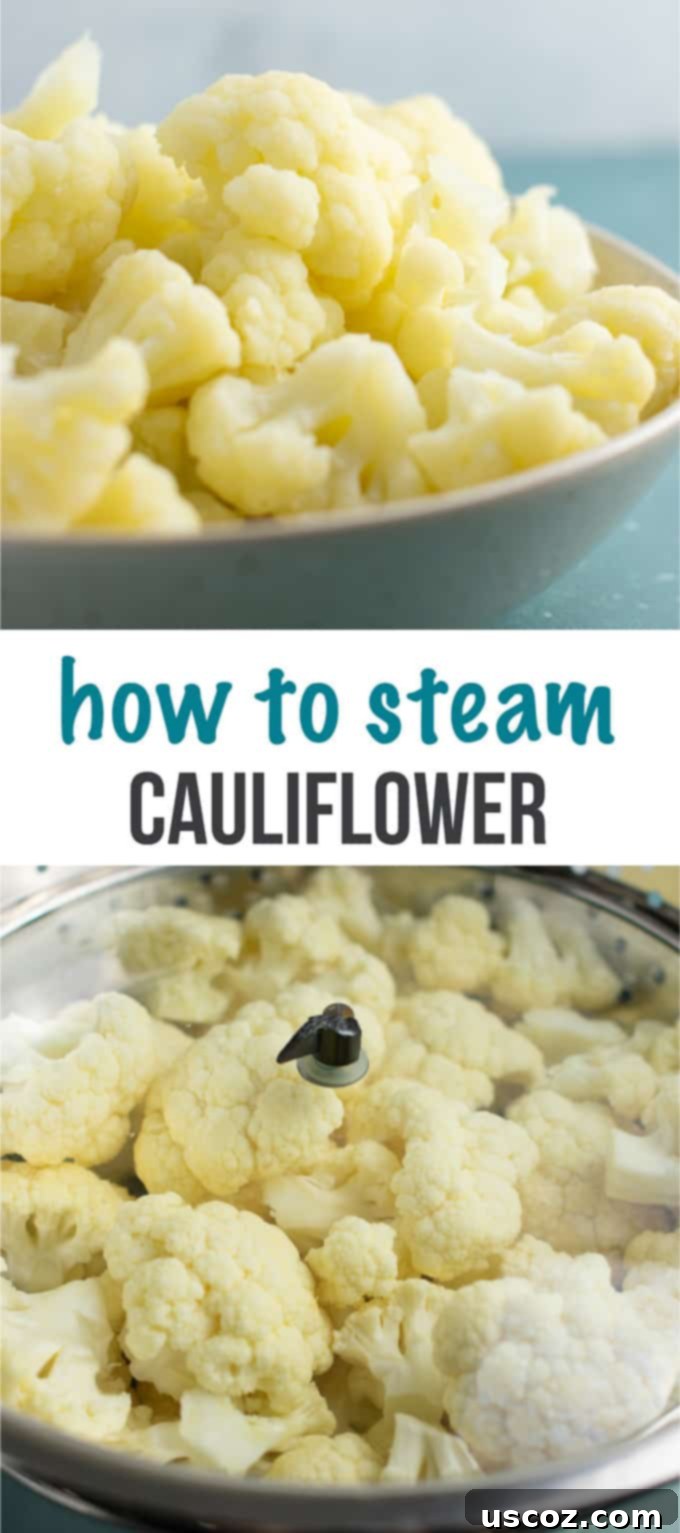

Print
How To Steam Cauliflower
Ingredients
- 1 medium head of cauliflower, cut into florets
- Water for steaming
- Salt & black pepper to taste, optional
Instructions
-
Rinse the head of cauliflower and cut it into evenly sized florets.
-
Place your colander (or steamer basket) into a large saucepan. Ensure the colander sits above the bottom of the pot, leaving room for water. Add 2-3 inches of water to the bottom of the saucepan, making sure it does not touch the colander.
-
Add the cauliflower florets into the colander.
-
Place the saucepan with the colander over medium-high heat and bring the water to a boil. Once boiling, cover the pot tightly with a lid to trap the steam. Reduce heat to medium-low to maintain a steady simmer.
-
Steam until the cauliflower is fork-tender, typically 15-25 minutes, depending on floret size and desired tenderness. Check the water level every 5-10 minutes and add more hot water if needed to prevent the pot from burning dry.
-
Carefully remove the colander from the pot. Serve immediately with a drizzle of butter, salt, and pepper, or pair with your favorite sauce like cheese sauce or Alfredo.
-
To make cauliflower rice, simply run a knife or food processor through the steamed cauliflower until it breaks into small, rice-like pieces. Serve immediately or use in recipes.
Nutrition
